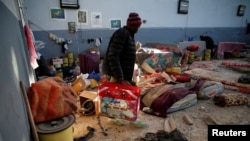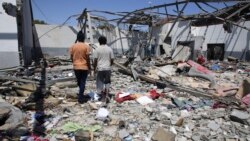United Nations agencies are calling for the release of all refugees and migrants from Libyan detention centers. The call comes in the wake of the deadly airstrike July 2 on the Tajoura detention center, on the outskirts of the capital, Tripoli.
The International Organization for Migration confirms 53 people, including six children, were killed and more than 130 injured in the Tuesday night bombing.
The casualties comprise almost one-third of the more than 600 migrants and refugees who were detained in the Tajoura facility and represent at least 17 nationalities, mainly African.
IOM spokesman Joel Millman says 350 migrants remain in the camp.
"Approximately 180, slightly more people in the Tajoura detention center, had already been registered for evacuation under the voluntary humanitarian assistance flights that we have been running out of Libya," Millman said. "We know of two people for certain who have died who were going to leave."
In April, the commander of the self-styled Libyan National Army, General Khalifa Haftar, launched an offensive against the U.N.-backed Government of National Accord in Tripoli. Neither side has claimed responsibility for the attack.
However, a spokesman for the U.N. refugee agency, Charlie Yaxley, says both sides knew where the civilians were sheltering.
"We reiterate once again that the coordinates of these detention centers in Tripoli are well-known to both sides of the conflict and this was a preventable tragedy that never should have happened," he said. "There needs to be a fundamental shift in approach now. The status quo cannot continue and that involves immediately releasing all detainees from detention centers in Libya."
The centers house migrants who came to Libya hoping to sail across the Mediterranean to Europe. Some started the journey, only to be intercepted at sea and returned to Libya, where most have no relatives or friends for support.
The UNHCR is calling for an independent investigation to determine who is responsible for the airstrike.
The head of the U.N. Support Mission in Libya, Ghassan Salame, and the U.N. human rights chief, Michelle Bachelet, have condemned the attack and said it could constitute a war crime.





